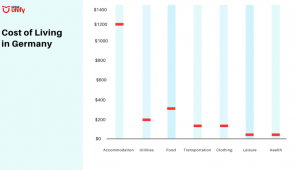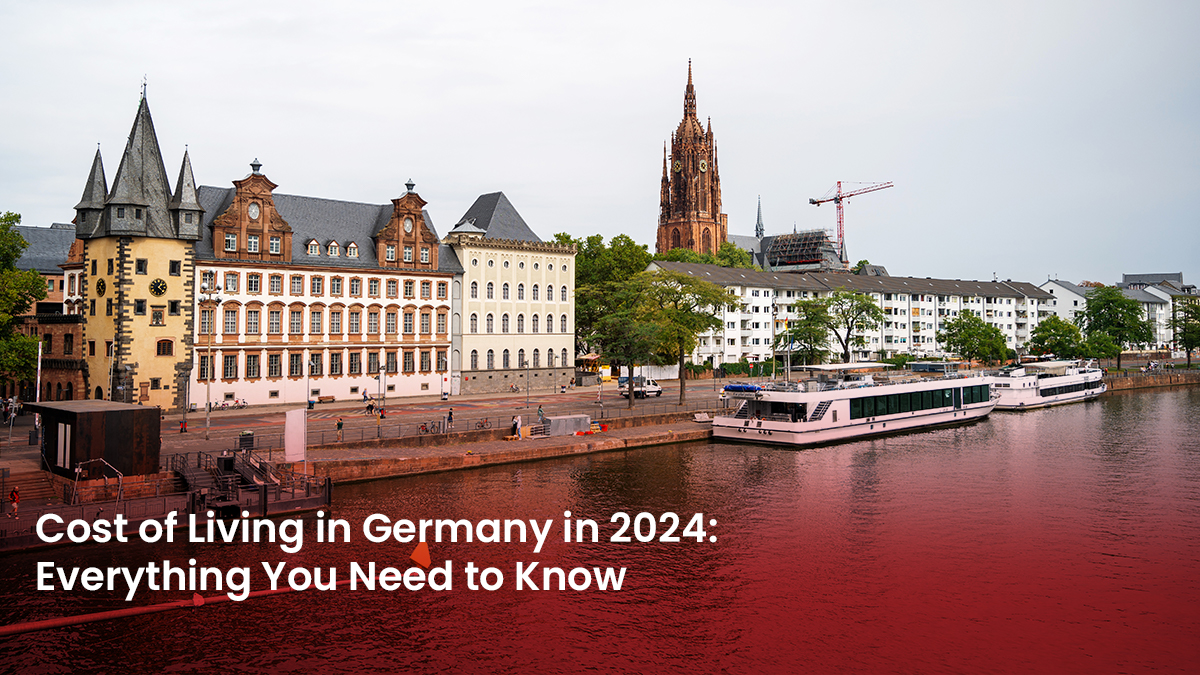Studying abroad can be an exciting and enriching experience, but it’s important to consider the cost of living in your destination country. For international students planning to study in Germany, this can be a major concern. However, the good news is that studying in Germany is generally quite economical compared to other European countries like the UK or France.
When it comes to student living expenses in Germany, it’s important to plan ahead. On average, international students can expect to spend anywhere between €850 to €1,200 per month, depending on their lifestyle and personal preferences. By carefully budgeting and managing your expenses, you can make the most of your time in Germany without breaking the bank.
How much is the cost of living in Germany?
The following table will help you get a fair idea of the common living expenses you will incur while you are studying in Germany.
| Category | Average monthly cost (€) |
| Rent (one-bedroom apartment in the city center) | €1200 approximately |
| Utilities (electricity, water, heating) | €200 approximately |
| Groceries | €300 approximately |
| Transportation (public transport pass) | €100 approximately |
| Entertainment (movie ticket) | €15 approximately |
| Clothing (basic items) | €100 approximately |
| Health insurance (mandatory for all residents) | €150 approximately |
Please note: The expenses mentioned in the table above are for reference only. The actual expenditure may vary depending on various factors.

The Pros and Cons of Living Off-Campus
Cost of living in Germany for a family of four
Germany is a popular destination for families, offering a high quality of life, excellent education, and a safe environment to raise children. However, the cost of living in Germany can vary depending on the city, lifestyle, and family size.
Housing
Housing is one of the biggest expenses for families living in Germany. Rent prices vary depending on the city, with Munich and Frankfurt being the most expensive cities to rent in. In general, families can expect to pay between €1,000 and €2,000 per month for a three-bedroom apartment in a city center.
Food
Groceries are relatively affordable in Germany, with families spending around €200-300 per week on food. However, dining out can be more expensive, with a meal at a mid-range restaurant costing around €20-€30 per person.
Transportation
Public transportation is efficient and affordable in Germany. A family of four can expect to pay around €100 per month for a public transportation pass.
Healthcare
Healthcare is mandatory for everyone residing in Germany, and the cost is covered by a combination of public and private insurance. Families can expect to pay around €100-150 per month for health insurance.
Other expenses
Other expenses such as clothing, personal care, and entertainment can add up to around €200-€300 per month for a family of four.
Total cost of living
The total cost of living for a family of four in Germany can range from €2,500 to €4,000 per month. This will vary depending on the family’s lifestyle, city of residence, and other factors.
5 Advantages of Living On-Campus
Cost of living in Germany as a family of two/ shared by two individuals
Living in Germany as a family of two or shared by two individuals can be an enriching and affordable experience. While the cost of living varies depending on the city and lifestyle, it’s generally manageable with careful planning and budgeting. Here’s a breakdown of the average monthly expenses for a family of two or two individuals sharing accommodation in Germany.
Accommodation
Rent is typically the most significant expense, ranging from €700 to €1,200 for a one-bedroom apartment in a city center. However, sharing accommodation can significantly reduce this cost. Consider renting a two-bedroom apartment or finding a roommate to split the rent.
Utilities
Utilities, including electricity, water, and heating, typically cost between €100 and €200 per month. This amount may vary depending on the apartment’s size, energy efficiency, and personal usage habits.
Groceries
Groceries are relatively affordable in Germany, with a family of two or two individuals spending around €200 to €300 per week on food. Shopping at discount grocery stores, cooking at home, and opting for seasonal produce can help save money on food expenses.
Transportation
Public transportation is efficient and affordable in Germany. A monthly public transportation pass for two people costs around €80 to €100. This allows for unlimited travel within the city or region, making it a cost-effective way to get around.
Health insurance
Health insurance is mandatory for people residing in Germany. A family of two or two individuals sharing accommodation can expect to pay around €200 to €300 per month for combined health insurance.
Other expenses
Other expenses, such as clothing, household supplies, and miscellaneous items, can add up to around €100 to €200 per month for two people. Careful budgeting, shopping at thrift stores, and utilizing discounts can help manage these expenses.
Total cost of living
The total cost of living for a family of two or two individuals sharing accommodation in Germany can range from €1,500 to €2,500 per month. This amount can be adjusted based on lifestyle choices, city location, and individual needs.
5 Advantages of Living On-Campus
Cost of living in Germany for an Indian student
The cost of living in Germany for an Indian student can vary depending on the city, lifestyle, and individual spending habits. However, on average, Indian students can expect to spend around €850 to €1,200 per month on living expenses. This includes rent, groceries, transportation, utilities, and other miscellaneous expenses.
Breakdown of average monthly expenses:
| Category | Average monthly cost (€) |
| Rent (shared accommodation) | €300 – €400 approximately |
| Utilities | €50 – €100 approximately |
| Groceries | €150 – €200 approximately |
| Transportation | €80 – €100 approximately |
| Dining out (occasional) | €50 – €80 approximately |
| Entertainment (movies, museums, etc.) | €30 – €50 approximately |
| Personal care (haircut, toiletries) | €30 – €50 approximately |
| Health insurance | €60 – €80 approximately |
| Other expenses (clothing, household supplies) | €50 – €100 approximately |
Please note: The expenses mentioned in the table above are for reference only. The actual expenditure may vary depending on various factors.
Total: €850 – €1,200 approximately
List of common expenses in Germany
This section entails a list of common expenses, including restaurant costs, travel expenses, and more that you are likely to encounter during your stay in the country.
Restaurants and cafes
| Category | Average cost per person (€) |
| Quick service restaurant (Burger King, McDonald’s, etc.) | €10 – €15 approximately |
| Casual dining restaurant (pasta, pizza, etc.) | €15 – €25 approximately |
| Mid-range restaurant (international cuisine) | €25 – €35 approximately |
| Fine dining restaurant (gourmet cuisine) | €50 – €100 approximately |
| Café (coffee, pastries) | €5 – €10 approximately |
| Street food (sausages, kebab, etc.) | €5 – €7 approximately |
Please note: The expenses mentioned in the table above are for reference only. The actual expenditure may vary depending on various factors.
Transport
| Transportation mode | Average single fare (€) | Day pass (€) | Monthly pass (€) |
| Bus | €2.00 – €3.00 approximately | €6.50 – €8.00 approximately | €70 – €100 approximately |
| Subway | €2.50 – €3.50 approximately | €7.00 – €9.00 approximately | €80 – €110 approximately |
| Tram | €2.20 – €2.80 approximately | €6.00 – €7.50 approximately | €75 – €100 approximately |
| Train (Regional) | €6.00 – €15.00 approximately | n/a | n/a |
| Train (Long-distance) | €20.00 – €100.00 approximately | n/a | n/a |
| Taxi | €5.00 – €7.00 approximately | n/a | n/a |
| Bike sharing | €1.50 – €2.00 per hour approximately | n/a | n/a |
| Car sharing | €0.20 – €0.30 per km approximately | n/a | n/a |
Please note: The expenses mentioned in the table above are for reference only. The actual expenditure may vary depending on various factors.
Monthly rent
| Apartment type | Average monthly rent (€) |
| Studio | €700 approximately |
| 1 Bedroom | €900 approximately |
| 2 Bedroom | €1200 approximately |
Please note: The expenses mentioned in the table above are for reference only. The actual expenditure may vary depending on various factors.
Average rent in Germany on a regional basis
| Region | Average monthly rent for a studio apartment (€) | Average monthly rent for a one-bedroom apartment (€) | Average monthly rent for a two-bedroom apartment (€) |
| Baden-Württemberg | €850 approximately | €1,050 approximately | €1,400 approximately |
| Bavaria | €1,200 approximately | €1,500 approximately | €1,900 approximately |
| Berlin | €1,000 approximately | €1,250 approximately | €1,700 approximately |
| Brandenburg | €650 approximately | €800 approximately | €1,100 approximately |
| Bremen | €700 approximately | €900 approximately | €1,200 approximately |
| Hamburg | €950 approximately | €1,200 approximately | €1,550 approximately |
| Hesse | €800 approximately | €1,000 approximately | €1,350 approximately |
| Lower Saxony | €600 approximately | €750 approximately | €1,050 approximately |
| Mecklenburg-Vorpommern | €550 approximately | €650 approximately | €900 approximately |
| North Rhine-Westphalia | €900 approximately | €1,100 approximately | €1,450 approximately |
Please note: The expenses mentioned in the table above are for reference only. The actual expenditure may vary depending on various factors.
Education costs in Germany
| Education level | Tuition fees (per semester) | Administrative fees (per semester) | Semester ticket (per semester) |
| Undergraduate | €0 | €250 – €500 approximately | €80 – €100 approximately |
| Master’s (consecutive) | €0 | €250 – €500 approximately | €80 – €100 approximately |
| Master’s (non-consecutive) | €1,500 – 30,000 approximately | €250 – €500 approximately | €80 – €100 approximately |
| Ph.D. | €0 – 3,000 approximately | €250 – €500 approximately | €80 – €100 approximately |
Please note: The expenses mentioned in the table above are for reference only. The actual expenditure may vary depending on various factors.
Cost of Living in Australia in 2024
Tips to save money for Indian students in Germany
Studying in Germany can be a rewarding experience, but it can also be financially challenging. As an Indian student living in Germany, there are many strategies you can employ to save money and make your time in this new country more affordable. Here are some practical tips to help you manage your finances effectively:
1. Choose a smaller, less expensive city
Living costs vary significantly across German cities. Opt for smaller cities like Leipzig, Dresden, or Jena, where accommodation, groceries, and transportation are more affordable than larger metropolitan areas like Munich or Frankfurt.
2. Live in shared accommodation
Sharing an apartment or dorm room with roommates can dramatically reduce your rent expenses. Consider joining student housing or seeking out like-minded individuals through university networks or online platforms.
3. Cook at home
Eating out can quickly drain your budget. Prepare your meals at home to save money and enjoy healthier options. Explore local markets and grocery stores for fresh and affordable ingredients.
4. Take advantage of student discounts
Many restaurants, museums, entertainment venues, and transportation providers offer discounted rates for students. Always ask for student discounts and carry your student ID with you.
5. Shop at discount grocery stores
Lidl, Aldi, and Netto are popular discount grocery chains in Germany that offer a wide range of affordable food and household items.
Get ahead of the game by knowing your study destination early on. Understanding the cost of living in Germany as a student can provide a sense of ease, allowing you to concentrate on your studies. These handy tips will help you manage your finances while studying in Germany. However, suppose you are overwhelmed with scholarship applications, university choices, or housing decisions. In that case, our expert counselors at MSM Unify are here to provide personalized and impartial guidance, ensuring your dreams become a reality without any stress!
FAQs
Is it expensive to live in Germany?
With an average cost of living between €1,698 and €3,561, Germany is one of the cheapest Western European countries to live in.
How much money do you need to live comfortably in Germany?
As a general estimate, you can anticipate monthly expenses ranging from €1200 to €3000 to live and study comfortably in Germany.
Is 2500 euro a good salary in Germany?
A monthly net income of EUR 2,500 to EUR 3,500 is considered to be a good salary in Germany. This can help you to afford a decent life in a prominent German city, which includes renting a safe and decent apartment, regularly eating out, and spending weekends away.
Is 1000 euros enough for a month in Germany?
In Germany, it is challenging to manage on less than €1,000 per month, with monthly costs rising to approximately €1,500 to €2,000 in cities with higher rents.












